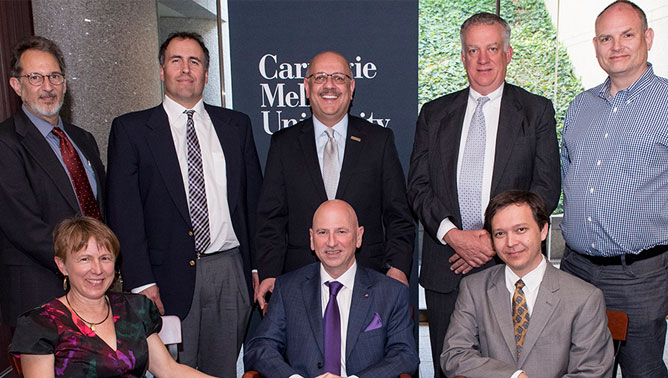
Salakhutdinov, Roeder and Wasserman Receive UPMC Professorships To Help Shape the Future of Healthcare
By Shilo Rea and Byron Spice
Carnegie Mellon University’s Ruslan "Russ" Salakhutdinov, Kathryn Roeder and Larry Wasserman have received endowed professorships from UPMC to fund work in statistics, artificial intelligence, machine learning and data analytics to help shape the future of healthcare.
The financial support continues nearly three decades of UPMC’s investment in CMU, which includes the Pittsburgh Health Data Alliance – a collaboration between CMU and the University of Pittsburgh that uses data to improve health outcomes and hopes to transform the practice of medicine.
"With the unprecedented access to data and incredible advances in computing technologies, we are seeing a paradigm shift affecting all sectors of our economy, but especially in our approach to health care and biomedical research," said CMU Interim President Farnam Jahanian. "Thanks to UPMC, we are seizing on the potential of this new standard and, through the work of Professors Salakhutdinov, Roeder and Wasserman, we will transform our system of healthcare from episodic, reactive, hospital-centered and disease-focused to preventative, evidence-based, and focused on the well-being and quality of life for the patient."
Salakhutdinov, the UPMC Professor of Computer Science, is a leading researcher in deep learning, a branch of machine learning that is transforming artificial intelligence. By mimicking processes used by the brain’s cortex, deep learning has helped computers dramatically improve their ability to understand human speech and language, to identify objects and actions in images and to discover substances that hold promise as pharmaceuticals.
His main research goal is to understand the computational and statistical principles required for discovering structure in large amounts of data, with interests in probabilistic graphical models and large-scale optimization, as well as deep learning. His recent work has included methods for computers to automatically detect objects in images, classify the content of videos and comprehend text.
Salakhutdinov joined the Machine Learning Department as an associate professor in 2016. In October 2016, Apple named him as its first director of AI research.
"Though Russ is still new to our faculty, he’s already having an impact on the direction of artificial intelligence research here," said Andrew Moore, dean of the School of Computer Science. "He came to us from the University of Toronto, a hotbed of deep learning research, and he hasn’t missed a beat since his arrival. His work on computer vision and natural language processing promises to change the way people interact with and use computers for years to come."
Roeder, the UPMC Professor of Statistics and Life Sciences in the Dietrich College of Humanities and Social Sciences who is also CMU’s vice provost for faculty, has played a pivotal role in developing the foundations of DNA forensic inference. Her current research focuses on statistical genomics and the genetic base of complex disease, with an emphasis on autism.
Recent discoveries by Roeder include developing new statistical tools that identified 65 genes associated with risk for autism spectrum disorder and predicted that several hundred more are yet to be found; providing clues about the genetic makeup of the disorder; and determining that although rare mutations can have a big impact on genetic risk for autism, most risk stems from common inherited genetic variants.
Roeder joined the CMU’s Department of Statistics in 1994 and has had an additional appointment in the Computational Biology Department since 2004.
"Kathryn is a great example of the approach that has made CMU matter," said Richard Scheines, dean of the Dietrich College of Humanities and Social Sciences. "She has done groundbreaking theoretical work, but work that is connected to pressing scientific problems like the genetic basis of autism. And she has not only made enormous contributions to the world of statistics, she has recently stepped in and made an enormous contribution to the university as vice provost. All in all, we are VERY lucky to have her on our faculty."
Wasserman, the UPMC Professor of Statistics and Data Sciences in the Dietrich College, researches both theoretical and applied statistics. On the theoretical side, he focuses on the intersection of statistics and machine learning, which is becoming increasingly important in the era of big data as both deal with analyzing data for high-dimensional problems. His work has provided new methods and theory for simultaneously estimating the relationships between large numbers of variables and for finding subtle spatial structure in complex datasets.
In application, Wasserman works in astrostatistics. He developed methods to estimate the equation for state of dark energy and to analyze the cosmic microwave background radiation. He is also working in the new area of topological data analysis, which works to find structure in data. In astronomy, this type of clustering helps to find filaments in the universe.
Wasserman joined the Department of Statistics in 1988 and, in the late 1990s, was one of the first CMU faculty members to engage in a research center that evolved into the Machine Learning Department, where he also holds a joint appointment. In 2016, Wasserman was elected to the National Academy of Sciences.
"Larry’s work is also a wonderful example of CMU’s strengths," said Scheines. "He has produced seminal work on inference, causation and machine learning, but he has also worked on incredibly creative and important applied work in astronomy and other fields. His interests and intellect are broad and his contributions are deep."
According to Jahanian, professorships make significant and life-changing research possible at Carnegie Mellon.
Pictured above are from left to right seated: Kathryn Roeder, Larry Wasserman and Ruslan “Russ” Salakhutdinov. Standing: Richard Scheines; Christopher Genovese, head of Department of Statistics; Farnam Jahanian; Tal Heppenstall, president of UPMC Enterprises and executive vice president and treasurer of UPMC; and Andrew Moore.